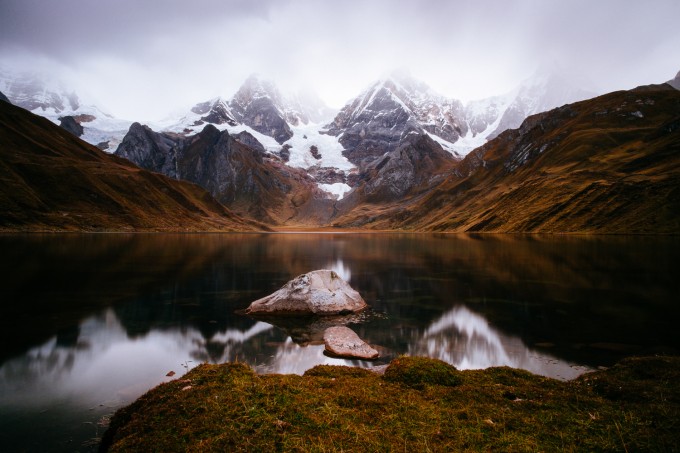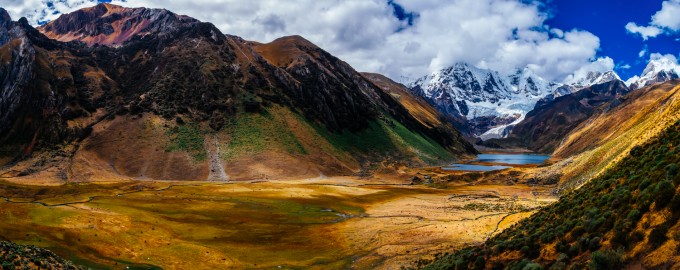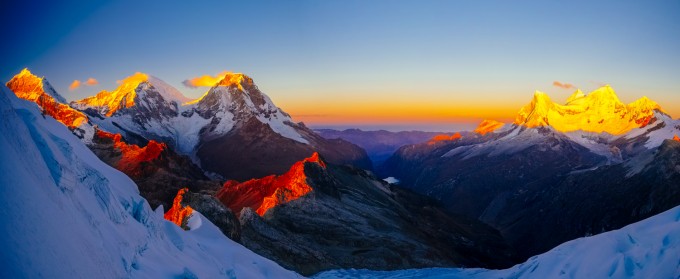Daily Inspiration #445 – Fuji 14mm f/2.8 in Peru by Eric Hodges
Hi Steve,
Attached are images from my Fuji X-E1 and 14 2.8 in Peru from this past July and August. We were there for almost a month. We did the classic Huayhuash trek and then climbed two mountains, Yanapaccha and Chopicalqui, in the Cordillera Blanca.
Yerupaja in the clouds at sunset
I shot almost exclusively with the Fujinon XF 14MM F2.8 R, which worked out great. I kept the camera in my jacket when up on the mountains. The batteries were kept in an inside pocket close to my chest. It was very nice to have a high quality camera that was much lighter than a DSLR when climbing and trekking at altitude. On the second mountain, Chopicalqui, I climbed to 6100m (20,013 ft.).
Jahuacocha Lake Panorama
The best photos from the trip are here:
http://www.flickr.com/photos/15358623@N08/sets/72157635275678271/
The trip was at fairly high altitudes. On the Huayhuash trek we were usually at 4200m (13,799 ft.) or higher. We went over 10 passes and the lowest pass was 4600m (15,092 ft.) and we did two passes at 5000m (16,404 ft.).
Best,
Eric






I’ve been on the Andes mountainrange, on the Bolivian side, and, the reality is you need to be there to experience the deep, cobalt blue skies, they are like nothing you can see at mundane sea levels. Same goes for the mountains and lakes, the richness in minerals make them pretty colourful.
Thanks for sharing.
Amazing shots, the 3rd in particular, the light is perfect.
Great pictures. Were the panoramas processed from RAW Or JPEG?
RAW only
Your Flickr series is exceptional. The Fuji does a really excellent job of capturing that stunning landscape. My only quibble is the overly strong colors in the last shot.
Thanks gsutton, yeah that last one is the only one where they were pushed more…I’ll probably put up another version.
Maxfield Parrish was an illustrator, Norman Rockwell called him his inspiration. Here is an image link from google to help you understand why i said M.P., would be proud. You have to see these in real life, they glow!
http://preview.tinyurl.com/m3c6of6
Ah interesting, thanks!
Colors look stunning indeed. It´s strange that I didn´t like the x-trans sensor colors in the past but now they seem to be fine. Is it my eyes or the raw converter?
I should add that I am not Eric Hodges 😉
It’s not the raw converter, just the post processing. I think the raw files are very flexible and dependent on the post work.
Wow the colours in the last image are simply stunning!
Hi Eric, Im using your last shot as the home screen on my ipad. Beautiful !
Cool! Thanks…
Incredible colors and image depth. A real showcase of this camera lens combo.
And no, not oversaturated!
Eric,
The last image would make maxfield parrish proud! Gorgeous!
Be well,
Laurence
Cool, not sure where maxfield parrish is…link?
Yerupaja in the clouds at sunset is very nice,my new wallpaper 🙂
Cool Steve!
stuck in an office today, pictures of beautiful scenery are not helping my concentration levels, nice stuff though.
Living in New Zealand, most of our hiking would be 3000m or so lower, but the colours get pretty wild, so it’s hard to comment on saturation without having been there. That would be an easy fix anyway, the images would still be fantastic either way.
Exceptional shots Eric – I especially like the panoramas. Did you use gradient filters for these, or use multiple exposures for sky and foreground?
thanks,
– P
Hi Peter, thanks, I’m glad you like them. I assume you mean gradient neutral densities? I didn’t. I exposed for the snow and then brought up the shadows in post. XE-1 dynamic range is pretty good. I shot some for hand held HDR, but I have not processed any that way yet. They were duplicate images anyway, so it’s low on my to do list. The only one that I used a tripod for was the long exposure at lake level at Carhuacocha.
The images are terrific. Definitely demonstrates just how good Fuji’s X-Trans sensor is in the X-E1, X100s and X-Pro 1. Many don’t realize that that sensor performs on a level that damn near matches the Canon 5D Mk III and even the Nikon D800 (though not in ultimate resolution when compared to the latter).
And that 14mm from Fuji is a very sweet lens.
btw, Eric: A great tripod for this kind of travel — and with the Fuji X-series cameras — is the Ultrapod II, IMO … in case you’re not already aware of it. More here >> http://www.industrialrev.com/ultrapod-ii.html
Thanks Robert, I’ll check that out. I used an Oben and a small ball head, which worked well and is very light.
Thanks everyone for your comments.
Saturation: The sky there is very blue with the high elevation. The lakes have amazing color and I think it’s pretty accurate. Having said that, I may have some of these over saturated a bit, although I don’t think by very much. The colors there were amazing. Also note, that the saturation/vibrance are not actually turned up much at all in many of these, see below.
I am changing my workflow by using Iridient Developer for the raw conversion and then working on them in Lightroom 5/Photoshop. I also often used the new VSCO slide film with a Velvia setting, although I then tweak it quite a bit. I’m tending to take all the grain out as well. Not all of the shots on flickr had Iridient in the process.
Eleven years ago I travelled to Lake Titicaca, which makes the border between Peru and Bolivia (I went from the Bolivian side). About what you say regarding the blues, I remember that I have never seen such a beautiful blue like the lake. I do not know if this was due to the high elevation (Lake Titicaca is around 4.000 m above sea level), but I agree that colours there were amazing!
That lake looks like a shot from Land Before Time. Brings back childhood memories.
Though I agree on Mako Koiwai that saturation is a tad too much (maybe on the last pic).
Those are some amazing shots that go along with an amazing place. The sharpness of that lens is awesome.
Astonishing shots.
Beautiful images but the over saturation make them look a bit weird. Easy fix in Photoshop etc. Are they direct out of camera?
Great shots. As to the saturation, if he feels that conveys what he saw and felt when taking the photo better then it’s right.
in most cases a “wrong” calibration of the monitor is the cause of making mistakes in postpro. so what he sees might not be the same as we see. of course everyone has the right to produce for people who like a very bright monitor adjustment. but the best solution – in order to be somehow universal – is to compare the photos on other monitors.
in my opinion – maybe – the fuji user tend to brighten their display too much cause of the rather dark output of the fuji cameras.
greetings michael
(who owns an EIZO Monitor at not so bright levels)
” the fuji user tend to brighten their display too much cause of the rather dark output of the fuji cameras”
not sure what you mean by that last bit, fuji doesn’t have darker output. it can have dark output, like any other camera, if you choose to.
these photographs seem to be fine from where I am (fully calibrated environment)
hello hexx,
of course not only the fuji user “develop” their pictures too dark and dense.
its also the fault of many of the common presets in lightroom
if i look at the above pictures at my eizo, they are ok. maybe a little bit too much edge-sharpening .. i dont know. if i look at them at my office. they look dark and dull. also at my girlfriends laptop.
so maybe all this contrast/detail enhancemenst and all that pi pa po makes the pics (only) looking good at bright backlit monitors, retina display and that kind of equipment.
dont know. i myself am still experimenting to find a way.
IMHO
greetings
michael
Saturation plus’ed a little … but I love them!
Looks like Velvia to me. Use to shoot a ton of that film on landscapes because of the super saturation.
PP?
Steve, many thanks for the post!
Best,
Eric
Beautiful places, truly. The images look a bit too saturated to my eye, looking at the intense blue sky for example. Having a person stand somewhere in the shots (in a small speck-of-a-human sort of way)would have made them even better!
to spoil the scenery and completely undermine the story given the location where these photographs have been captured? no, definitely no. to me these images tell the story of unspoiled beauty.
great photographs Eric
Agreed. Having people in these photos would definitely NOT enhance them.
That’s is I’m getting that lens today. Beautiful shots!
Fujifilm is the new Leica 😀 .Outstanding pictures . I want to go to Peru next month
Amazing place, amazing setup, amazing photo.
Congrats!
Beautiful pictures – Peru is bliss! And the 14 2.8 is a real gem for the X series. Couldn’t be happier with the best wide angle by Fuji